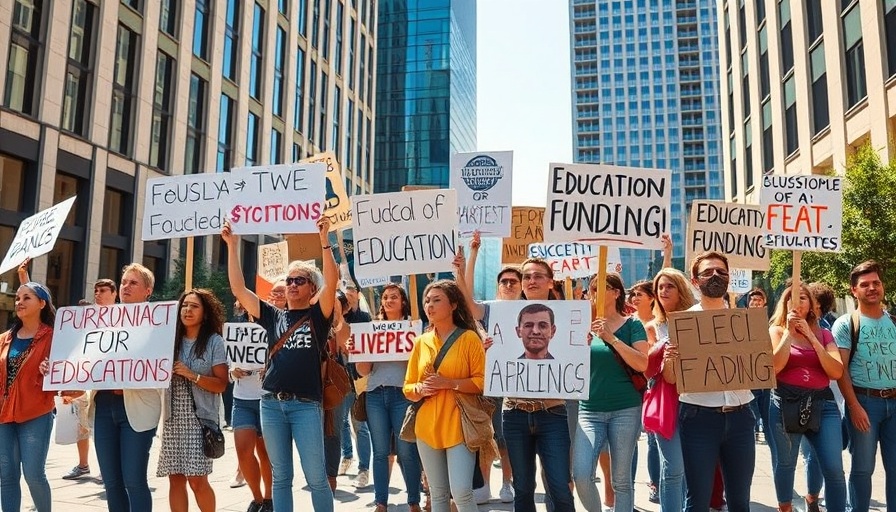
The Alarm Over Proposed Education Budget Cuts in Ohio
Cincinnati seems to be on the frontline of a growing discontent as families rally against a staggering proposed cut of $27 million from Cincinnati Public Schools (CPS) over the next two years. This pushback, which unfolded in a spirited protest at Fountain Square, embodies a rising concern over the education funding crisis affecting low-income students and those requiring special education.
The proposed cuts are part of Governor Mike DeWine's broader budget that is set to slash $103.4 million in education funding across Ohio, simultaneously boosting financial support for charter and private schools by $500 million. This has raised eyebrows and ignited passionate responses from parents like Sarah Beach, who stressed the critical need for adequate public funding.
Sacrifice and Resourcefulness: A Community's Response
The reality of the budget cuts hit home for many when a recent school newsletter circulated a GoFundMe campaign to secure math workbooks—a basic educational resource. "If we have to rely on GoFundMe for math workbooks, where does that leave us in terms of adequate educational resources?" remarked Beach, questioning the state's commitment to public schools.
This phenomenon underscores a vital issue: the fight for equitable education funding is becoming a community-driven initiative, as highlighted by parents rallying together to ensure their children don't miss out on essential learning materials. Many view these grassroots efforts as indicative of a larger trend: families stepping up to fill the gaps left by state initiatives.
Community Voices: A Call to Action
The outcry from Cincinnati’s parents reflects a broader discontent in Ohio's educational landscape. "We don’t have anyone in that office to speak with; how are we represented?" lamented a protester, underlining the disconnect some residents feel between them and their government. This sentiment was echoed by CPS Superintendent Shauna Murphy, who voiced her apprehension about the long-term implications on educational programs and local taxes.
Post-protest, many parents, educators, and advocates have pledged to remain vigilant, seeking solutions that protect public schools. They have turned to City Hall and the governor’s office demanding answers on how the proposed budget will affect their children's education. "If you want to make change in the world, you should come out and do something," said Jacob Houston, a passionate protester encouraging civic engagement.
Historical Context: Learning from the Past
This struggle for education funding in Ohio is not new. The 1997 DeRolph case deemed the state’s school funding system unconstitutional, yet the core issues persist. Reports suggest that the system still inadequately serves low-income communities despite ongoing updates and reforms. The current protests serve as a reminder of the continued fight for equitable funding—a fight that Cincinnati families are now leading once again.
Looking Ahead: Future Implications for Education in Ohio
The implications of such budget cuts could resonate far beyond the classroom. Parents worry about a future where educational quality diminishes, potentially impacting job prospects and economic stability. "We need more than just assurance; we need results that reflect an understanding of our children's needs," Beach stated passionately. The ongoing protests underline a critical moment: families demanding accountability and a prioritization of public education funding in Ohio.
The resolve shown by parents, students, and educators serves as an essential reminder of the role community plays in safeguarding education. Efforts to raise awareness about budget cuts may well be the catalyst for change needed to ensure future generations receive the education they deserve. The Cincinnati community remains steadfast, vowing to voice their needs until equitable funding is ensured.
In an era where budget decisions have such immediate and profound effects, it is crucial for community voices to galvanize and influence local and state education policy. Cincinnati families are not just creating dialogue—they are demanding action.
 Add Row
Add Row  Add
Add 




Write A Comment